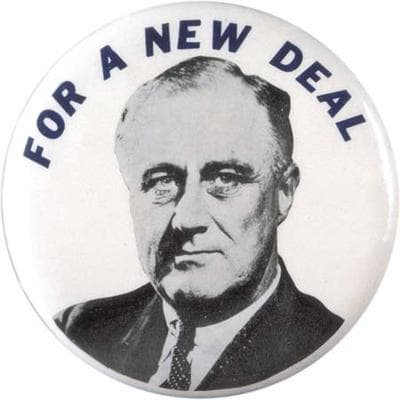Advertisement
Channeling FDR: The Republicans Need A New Deal
Four months after blowing the presidential election, Republicans hold the first cattle show for their 2016 nomination this week, when potential candidates strut before the annual Conservative Political Action Conference (CPAC) in Maryland. With pundits in and outside the party calling for it to re-frame its message to appeal to a changing electorate, it would be refreshing to hear some speaker toss out a seemingly radical idea that really isn’t: a New Deal-style jobs program.
While we associate jobs programs with President Franklin D. Roosevelt’s liberal arsenal against the Great Depression, the idea is as all-American as baseball.
I suggest this both as a registered Republican and a proud native New Jerseyan who thinks it was a boneheaded call to keep Garden State Gov. Chris Christie off the rostrum. Reports suggest the brainiacs behind the conference objected in part to Christie’s moderate stands on some issues, thereby snubbing the man many consider to be the most popular governor in the country. But a party on the ropes needs to hear all ideas from all its factions. And with long-term unemployment ghastly high despite February’s drop in unemployment, public works offers a conservative answer to a real and present disaster wrecking millions of lives.
Yes, conservative. While we associate jobs programs with President Franklin D. Roosevelt’s liberal arsenal against the Great Depression, the idea is as all-American as baseball. Of course, no CPAC speaker will endorse it, with Republican officials currently enthralled by the Tea Party’s unified field theory of governance: always cut, cut, and then cut some more. All the more reason to dispense with some myths about public works:
Jobs programs must have been dreamt up by Karl Marx.
Actually, they’ve been with us since America’s adolescence. The great antebellum Senator Henry Clay included public works (“internal improvements,” as they were called) as part of his “American System” of building the nation’s economy. Those of us who didn’t slumber through high school history recall the government’s role in constructing such successful improvements as the Erie Canal.

OK, but those public works built a young nation. Now you want to use them for bleeding-heart stuff like putting idle people back to work.
Sorry, but the idea is neither new nor the sole patent of Marxists. After the Civil War, the savior of the Union, Ulysses S. Grant, serving as a Republican president, pondered a jobs program to ease the devastating joblessness from the Panic of 1873. Unfortunately, Grant let himself be talked out of the idea, muffing his chance to be FDR six decades before FDR. Later, during the depression of the 1890s, businessman Jacob Coxey marched his “Coxey’s Army” of unemployed men on Washington to demand public works. Most considered it a nutty idea, and no federal program was forthcoming. But several cities put the jobless to work in what one historian called the first notable use in America of government jobs to fight an economic slump.
When our economic roof caved in during the 1930s, the New Deal enacted Coxey’s vision. Yes, FDR was a liberal, and yes, some of the jobs were make-work, and yes, they didn’t end the Depression. But critics of FDR’s jobs programs play fast and loose with numbers to camouflage the real decline in unemployment under the New Deal. And World War II, which did end the Depression, did so because it was the world’s biggest jobs program.
Advertisement
Forget history. What reputable Republican has supported a New Deal-ish work program in modern times?
At least two who ran for president, one of whom sold me on the idea. As a young reporter in 1988, I covered the presidential bid of Pierre “Pete” du Pont. The former Delaware governor campaigned as a movement conservative on a platform that included a jobs program, with a thoroughly conservative rationale. Du Pont argued that replacing welfare with work was better for both the poor (who got the dignity and pride of a job) and the taxpayers (who got public improvements and services, even if it cost more than welfare). And du Pont plugged his plan during the 1980s boom; it makes even more sense in our current, agonizingly slow-to-end bust.
Public works offers a conservative answer to a real and present disaster wrecking millions of lives.
More recently, former Arkansas Gov. Mike Huckabee proposed massive public works during his 2008 campaign, even with deficits swelling.
True, neither du Pont nor Huckabee won. But neither did Mitt Romney, with his dissing of the 47 percent. It’s also true that supporting public jobs doesn’t require abandoning Republicans’ sound notion of cutting wasteful spending that’s ineffective at helping the needy, or even hurting them. The former category includes a raft of programs for disadvantaged young people, including liberals’ beloved Head Start. As for the latter, the $5 billion we’ll spend this year on farm subsidies will continue impoverishing developing world farmers by driving down the prices they get for their products.
A CPAC speaker could warm up the crowd by calling for such cuts. Then he could wake up the crowd, and perhaps his party’s prospects, by laying down a blueprint for getting desperate Americans to work.
Related:
This program aired on March 13, 2013. The audio for this program is not available.